London Marathon
The London Marathon is an annual marathon event held in London, United Kingdom. Founded by athletes Chris Brasher and John Disley in 1981, it is typically held in April. The largely flat course is set around the River Thames, starting in Blackheath and finishing at The Mall. Hugh Brasher (son of Chris) is the current Race Director and Nick Bitel its Chief Executive.
| London Marathon | |
|---|---|
 | |
| Date | April |
| Location | London, United Kingdom |
| Event type | Road |
| Distance | Marathon |
| Established | 29 March 1981 |
| Course records | Men: 2:02:37 (Eliud Kipchoge, 2019) Women: 2:15:25 (Paula Radcliffe, 2003) Wheelchair men: 1:28:57 (Kurt Fearnley, 2009) Wheelchair women: 1:39:57 (Manuela Schär, 2017) |
| Official site | www |
The race has several components: it has a mass race for the public, professional races for men and women long-distance runners, elite level wheelchair races for men and a women, plus a 3-mile mini marathon event for under-17 athletes. The mass race is the largest marathon event in the United Kingdom and its third largest running event (after the Great North Run and Great Manchester Run). There is a significant charity running aspect to the marathon, with participants helping to raise over £1 billion since its founding, including £66.4 million at the 2019 London Marathon which was the highest amount for a single-day fund-raising event.[1]
Since 2006, the elite race has been part of the World Marathon Majors, which includes six of the world's top level marathon races. The London Marathon has seen the marathon world record broken on seven occasions: Khalid Khannouchi broke the men's record in 2002, while women's records have been broken by Grete Waitz (1983), Ingrid Kristiansen (1985), Paula Radcliffe (2002, 2003, 2005) and Mary Jepkosgei Keitany (2017). The current elite course records are held by Eliud Kipchoge (2:02:37 in 2019) and Paula Radcliffe (2:15:25 in 2003). The current wheelchair course records are held by Kurt Fearnley (1:28:57 in 2009) and Manuela Schär (1:39:57 in 2017).
The 2020 London Marathon is set for 4 October, having been postponed from the traditional April scheduling due to the COVID-19 outbreak.[2] The mass event was subsequently cancelled, with a modified elite-only race scheduled to take place.[3] The race often has a title sponsorship, and is currently branded as the "Virgin Money London Marathon".
Editions
| Edition | Date | Applicants | Accepted | Starters | Finishers | Charity raised (£ millions) |
Official charity |
|---|---|---|---|---|---|---|---|
| 1 | 29 March 1981 | 20,000 | 7,747 | 7,055 | 6,255 | N/A | |
| 2 | 9 May 1982 | 90,000 | 18,059 | 16,350 | 15,116 | N/A | |
| 3 | 17 April 1983 | 60,000 | 19,735 | 16,500 | 15,793 | N/A | |
| 4 | 13 May 1984 | 70,000 | 21,142 | 16,992 | 15,675 | SportsAid | |
| 5 | 21 April 1985 | 83,000 | 22,274 | 17,500 | 15,873 | Jimmy Saville’s Marathon Appeal | |
| 6 | 20 April 1986 | 80,000 | 25,566 | 19,261 | 18,067 | Middlesex Hospital Research Fund British Sports Association for the Disabled | |
| 7 | 10 May 1987 | 80,000 | 28,364 | 21,485 | 19,586 | St Thomas' Hospital Farnham Park Trust British Sports Association for the Disabled | |
| 8 | 17 April 1988 | 73,000 | 29,979 | 22,469 | 20,932 | Wishing Well Appeal SportsAid | |
| 9 | 23 April 1989 | 72,000 | 31,772 | 24,452 | 22,701 | Community Action Trust The Evelina Family Trust Special Olympics | |
| 10 | 22 April 1990 | 73,000 | 34,882 | 26,500 | 25,013 | Battle of Britain Appeal Community Action Trust | |
| 11 | 21 April 1991 | 79,000 | 33,485 | 24,500 | 23,435 | Action on Addiction Royal Marsden Cancer Research | |
| 12 | 12 April 1992 | 83,000 | 34,250 | 24,500 | 23,833 | Guy's Hospital Evelina London Children's Hospital Tuskforce | |
| 13 | 18 April 1993 | 68,000 | 35,820 | 25,000 | 24,495 | St John Ambulance Snowden Award Scheme | |
| 14 | 17 April 1994 | 72,000 | 37,379 | 26,000 | 25,242 | British Heart Foundation Childline | |
| 15 | 2 April 1995 | 79,000 | 39,097 | 27,000 | 25,377 | Leonard Cheshire Disability Cancer Relief Macmillan | |
| 16 | 21 April 1996 | 68,000 | 39,173 | 27,134 | 26,806 | British Heart Foundation National Asthma Campaign | |
| 17 | 13 April 1997 | 78,000 | 39,813 | 29,500 | 29,189 | British Heart Foundation NSPCC | |
| 18 | 26 April 1998 | 96,000 | 42,228 | 30,663 | 29,972 | Age Concern Diana, Princess of Wales Memorial Fund | |
| 19 | 18 April 1999 | 87,000 | 43,774 | 31,582 | 30,849 | Whizz-Kidz Leukaemia Research | |
| 20 | 16 April 2000 | 93,000 | 42,596 | 32,620 | 31,698 | Mencap | |
| 21 | 22 April 2001 | 92,000 | 43,517 | 31,156 | 30,318 | MS Society | |
| 22 | 14 April 2002 | 99,000 | 46,083 | 33,297 | 32,950 | Outward Bound FCWL | |
| 23 | 13 April 2003 | 111,000 | 45,629 | 32,746 | 32,324 | Shelter | |
| 24 | 18 April 2004 | 108,000 | 45,219 | 32,746 | 32,012 | Sense British Heart Foundation | |
| 25 | 17 April 2005 | 132,000 | 47,969 | 35,600 | 35,300 | Help the Hospices | |
| 26 | 23 April 2006 | 119,000 | 47,020 | 33,578 | 33,250 | The Stroke Association Anthony Nolan | |
| 27 | 22 April 2007 | 128,000 | 50,039 | 36,396 | 35,729 | 46.5 | WellChild |
| 28 | 13 April 2008 | 120,000 | 48,630 | 35,037 | 34,637 | 46.7 | Heart UK Spinal Injuries Association |
| 29 | 26 April 2009 | 155,000 | 49,995 | 35,884 | 35,404 | 47.2 | The Children's Trust |
| 30 | 25 April 2010 | 163,000 | 51,378 | 36,956 | 36,666 | 50.6 | CLIC Sargent |
| 31 | 17 April 2011 | 163,926 | 50,532 | 35,303 | 34,872 | 51.8 | Oxfam |
| 32 | 23 April 2012 | 170,150 | 50,200 | 37,227 | 36,812 | 52.8 | TeamPB (Prostate Cancer Charity) (Breast Cancer Care) |
| 33 | 21 April 2013 | 167,449 | 48,323 | 34,631 | 34,381 | 53.0 | YouthNet Age UK |
| 34 | 13 April 2014 | 169,682 | 49,872 | 36,337 | 35,977 | 53.2 | Anthony Nolan |
| 35 | 26 April 2015 | 172,888 | 51,696 | 38,020 | 37,793 | 54.1 | Cancer Research UK |
| 36 | 24 April 2016 | 247,069 | 53,152 | 39,523 | 39,140 | 59.4 | NSPCC |
| 37 | 23 April 2017 | 253,930 | 53,229 | 40,048 | 39,487 | 61.5 | Heads Together |
| 38 | 22 April 2018 | 386,050 | 54,685 | 40,926 | 40,220 | 63.7 | Teenage Cancer Trust |
| 39 | 28 April 2019 | 414,168 | 56,398 | 42,906 | 42,549 | 66.4[1] | Dementia Revolution |
| 40 | 4 October 2020 | 457,861 | Mencap |
History
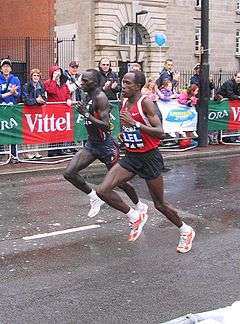
The London Marathon was not the first long-distance running event held in the city, which has a long history of marathon events. The Polytechnic Marathon (also known as the Poly) was first held in 1909.[6]
The current London Marathon was founded in 1981 by Olympic champion and journalist Chris Brasher and athlete John Disley.[7][8] Shortly after completing the New York City Marathon in November 1979 Brasher wrote an article for The Observer newspaper which began:
To believe this story you must believe that the human race be one joyous family, working together, laughing together, achieving the impossible. Last Sunday, in one of the most trouble-stricken cities in the world, 11,532 men and women from 40 countries in the world, assisted by over a million black, white and yellow people, laughed, cheered and suffered during the greatest folk festival the world has seen.[9]
Inspired by the people of New York coming together for this occasion, he asked "whether London could stage such a festival?"[7] The following year Brasher and Disley made trips to America to study the organisation and finance of big city marathons (such as those in New York and Boston). Brasher signed a contract with Gillette for £50,000, established charitable status and outlined six main aims in the hope to mirror the scenes he witnessed in New York and establish the United Kingdom on the map as a country capable of arranging major events. The London Marathon was born.[10]
The first London Marathon was held on 29 March 1981, more than 20,000 applied to run. 6,747 were accepted and 6,255 crossed the finish line on Constitution Hill. The Marathon's popularity has steadily grown since then. As at 2009, 746,635 people have completed the race since its inception.[7] In 2010, 36,549 people crossed the line, the biggest field since the race began.[11] The first wheelchair marathon race was held in 1983 and the event was credited with reducing the stigma surrounding disabled athletes.[12] In 2013 the IPC Athletics Marathon World Cup was held within the London Marathon featuring athletes of both genders in the T42–T46 and T11–T13 categories.[13] In August 2013 it was announced that the event would be staged in London until 2017 and feature athletes in the T11-T12, T13, T42-T44, T43, T45-46, T51-52 and the T53-54 class.[14]
For many years the London and Polytechnic Marathons competed with each other until, in 1996, the latter folded in due to the popularity of the former.[6]
Following the Boston Marathon bombing, organisers of the 2013 London Marathon undertook a review of their security arrangements, despite no specific threats against the event.[15] A 30-second silence was held before the start of the marathon to show respect and support to those affected by the tragedy.[16]
Organisation
The race is currently organised by Hugh Brasher, son of Chris, as Race Director and Nick Bitel as Chief Executive. Previously David Bedford and Bitel had overseen a period of great change for the race, including amendments to the course in 2005 which saw the cobbled section by the Tower of London replaced with a flat stretch along the Highway.[17]
Dan Tunstall Pedoe was the medical director of the London Marathon for 25 years between the first one in 1981 until 2005. In 2003, Pedoe was shadowed by Sanjay Sharma from St George's Hospital (University of London) who took over the role in its entirety in 2006.[18] Medical cover is provided by 150 doctors. Also assisting were more than 1,500 volunteers of St. John Ambulance, who organise over 50 first aid posts along the route, and three field hospitals at the finish. St John Ambulance also provide a number of healthcare professions for the event, including nurses, paramedics, ambulances with crews.[19]
The BBC covers the event, devoting rolling coverage for most of the morning. The theme music associated with this coverage, and with the event itself, is called "Main Titles to The Trap", composed by Ron Goodwin for the film The Trap.
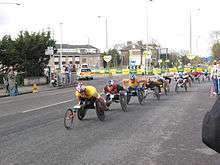
There are three separate groups of starters: Elite Women, Wheelchair (Men and Women), and Elite Men followed by Mass Race.[20]
Since 2010, the race has been sponsored by Virgin Money.
Course

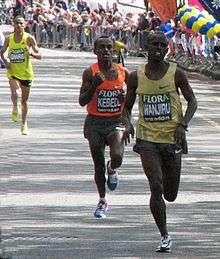
The marathon is run over a largely flat course around the River Thames, and spans 42.195 kilometres (26.219 mi). [21]
The route has markers at one mile intervals. Although the race publicity (athlete advice, timing charts and so on) is mile-oriented,[22] the individual timing splits that are available to competitors after the event are kilometre-oriented.[23]
The course begins at three separate points: the 'red start' in southern Greenwich Park on Charlton Way, the 'green start' in St John's Park, and the 'blue start' on Shooter's Hill Road.[24] From these points around Blackheath at 35 m (115 ft) above sea level, south of the River Thames, the route heads east through Charlton. The three courses converge after 4.5 km (2.8 miles) in Woolwich, close to the Royal Artillery Barracks.[24][25]
As the runners reach the 10 km mark (6.2-mile), they pass by the Old Royal Naval College and head towards Cutty Sark drydocked in Greenwich. Heading next into Deptford and Surrey Quays/Rotherhithe in the Docklands, and out towards Bermondsey, competitors race along Jamaica Road before reaching the half-way point as they cross Tower Bridge. Running east again along The Highway through Wapping, competitors head up towards Limehouse and into Mudchute in the Isle of Dogs via Westferry Road, before heading into Canary Wharf.[24][25]
As the route leads away from Canary Wharf into Poplar, competitors run west down Poplar High Street back towards Limehouse and on through Commercial Road. They then move back onto The Highway, onto Lower and Upper Thames Streets. Heading into the final leg of the race, competitors pass The Tower of London on Tower Hill. In the penultimate mile along The Embankment, the London Eye comes into view, before the athletes turn right into Birdcage Walk to complete the final 352 m (385 yards), catching the sights of Big Ben and Buckingham Palace, and finishing in The Mall alongside St. James's Palace.[24][25] This final section of the route formed part of the 2012 Olympic Marathon Course.
Since the first marathon, the course has undergone very few route changes. In the first race, the course took a diversion around Southwark Park before re-joining Jamaica Road on the way to Tower Bridge and was routed through St Katherine Docks past the Tower Hotel, en route to the Tower of London and the cobblestoned stretch of road that in later years was carpeted, to help runners prevent injury on the uneven surface. In 1982, the finishing post was moved from Constitution Hill to Westminster Bridge due to construction works. It remained there for twelve years before moving to its present location at The Mall. In 2005, the route around the Isle of Dogs between 22 and 34 kilometres (14 and 21 mi) was switched from a clockwise to an anti-clockwise direction, and at 35 km (22 miles) the route was diverted to avoid St Katherine Docks and the cobblestoned area near the Tower of London. In 2008, a suspected gas leak at a pub in Wapping diverted the course, but in 2009 the race followed the same path as in 2007.[26][27]
Results
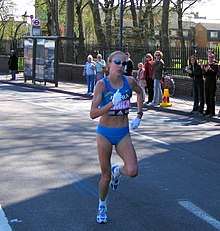
London is one of the top six world marathons that form the World Marathon Majors competition with a million prize purse.[28] The inaugural marathon had 7,741 entrants, 6,255 of whom completed the race.[29] The first Men's Elite Race in 1981 was tied between American Dick Beardsley and Norwegian Inge Simonsen, who crossed the finish line holding hands in 2 hours, 11 minutes, 48 seconds.[30] The first Women's Elite Race, also in 1981, was won by Briton Joyce Smith in 2:29:57.[30] In 1983, the first wheelchair races took place. Organized by the British Sports Association for the Disabled (BASD), 19 people competed and 17 finished. Gordon Perry of the United Kingdom won the Men's Wheelchair Race, coming in at 3:20:07, and Denise Smith, also of the UK, won the Women's Wheelchair Race in 4:29:03.[31]
World records for marathon running have been set several times. Khalid Khannouchi, representing the United States, set the men's world record in 2:05:38 in 2002. The following year, British runner Paula Radcliffe set the women's world record in 2:15:25 (later briefly downgraded to "world best" by the IAAF as it was achieved in a mixed race,[32] but restored to the title of "world Record" shortly thereafter); in 2017 Mary Keitany of Kenya set a world record of 2:17:01 for an all-women's marathon. Previous women's world records were set in 1983 and 1985 by Grete Waitz and Ingrid Kristiansen respectively, both of Norway. The current men's course record is 2:02:37 set by Kenyan Eliud Kipchoge in 2019. Kurt Fearnley of Australia set the Men's Wheelchair Race course record at 1:28:57 in 2009, and the Women's equivalent was set by American athlete Tatyana McFadden in 2013, with 1:46:02.[33]
Amateur runners
The race attracts amateur runners who make up the bulk of the thirty thousand or more participants; commonly running in fancy dress for charity causes. In 2002, Lloyd Scott completed the marathon wearing a deep sea diving suit that weighed a total of 110 lb (50 kg), with each shoe weighing 24 lb (11 kg); he also set a record for the slowest London Marathon time.[34] On 19 April 2003, former boxer Michael Watson, who had been told he would never be able to walk again after a fight with Chris Eubank, made headlines by finishing the marathon in six days. In 2006, Sir Steve Redgrave (winner of five consecutive Olympic gold medals) set a new Guinness World Record for money raised through a marathon by collecting £1.8 million in sponsorship. This broke the record set the previous year by the founder of the Oasis Trust, Steve Chalke, who had collected over £1.25 million. In 2011, Chalke raised a new record £2.32 million.[35] The £500 that Claire Squires collected before the race increased to £920,000 after she died having collapsed during the 2012 race.[36]
A small number of runners, known as the "Ever Presents", have completed each of the London Marathons since 1981. When the list was first established in 1995, there were 42. After 2019, their number has shrunk to 10. At the running of the 2019 event, the oldest runner was 85-year old Kenneth Jones, whilst the youngest runner was 60-year-old Chris Finill. They are all male.[37]
Mini Marathon
The Virgin Money Giving Mini London Marathon is the sister of The London Marathon. The course is the last 3 mi (4.828 km) of the London Marathon and is for u13s, u15s and u17s from all 33 London Boroughs along with 13 teams from ten English regions and three Home Countries: Scotland, Wales and Northern Ireland. There is also a Mini Wheelchair race on the day.[38] The race doubles as the British Athletics 3mile Championships.
BBC live coverage
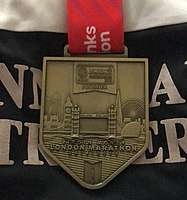
Since 1981, the BBC has broadcast live coverage of the London Marathon.[39] The main presenters on BBC One have been Sue Barker, Jonathan Edwards and Gabby Logan. The highlight presenters on BBC Two have been Jonathan Edwards (2007–12), Sonali Shah (2013), and Helen Skelton (2014–15). The commentators between for the Marathon on the BBC were David Coleman, Ron Pickering, Brendan Foster, Paul Dickinson, Steve Cram, Stuart Storey, Paula Radcliffe, Dame Tanni Grey-Thompson, Liz McColgan and Rob Walker.
Theme tune
The theme tune used by the BBC every year is from the film score of The Trap, a 1966 film about a Canadian fur trapper, starring Oliver Reed and Rita Tushingham. The music was written by Ron Goodwin and is performed by the Bournemouth Symphony Orchestra.[40][41]
Sponsorship and marketing
The original sponsors of the London Marathon were Gillette, who sponsored the event from 1981 to 1983. Subsequent sponsors have been Mars (1984–1988), ADT (1989–1992), NutraSweet (1993–1995), and Flora (1996–2009).[42][43] The current sponsors, Virgin Money, have sponsored the marathon since 2010, after signing a five-year £17m sponsorship deal in 2008. On 22 April 2013 the London Marathon renewed its sponsorship deal with Virgin Money for a further five years and the race changed its name to the Virgin Money London Marathon.[44][45]
A number of other companies and organisations also use the event for brand identification and marketing, including New Balance,[46] Lucozade Sport, Fuller's Brewery and Abbott Laboratories.
See also
References
- 2019 Virgin Money London Marathon smashes world fundraising record. London Marathon (2019-09-25). Retrieved 2020-04-26.
- Ingle, Sean (2020-03-13). London Marathon postponed to 4 October in response to coronavirus. Guardian. Retrieved 2020-03-13.
- "London Marathon: 2020 edition to be elite-only race, with mass event cancelled". BBC Sport. Retrieved 6 August 2020.
- Stats and Figures. London Marathon. Retrieved 2020-04-26.
- 2019 London Marathon Media Guide. London Marathon. Retrieved 2020-04-26.
- Kingston Harriers, The Polytechnic Marathon, a short history Archived 9 October 2007 at the Wayback Machine
- "Virgin London Marathon – Background". Archived from the original on 6 May 2009. Retrieved 29 April 2009.
- "Runner's World, Vol. 42, No. 1". Rodale, Inc. January 2007: 82. ISSN 0897-1706. Retrieved 30 September 2010. Cite journal requires
|journal=(help) - "The London Marathon story". BBC Online. 7 April 2004. Retrieved 14 May 2012.
- "Flora London Marathon – Background". Archived from the original on 11 June 2008. Retrieved 6 November 2008.
- "Record Numbers Finish Virgin London Marathon". Archived from the original on 15 July 2012. Retrieved 30 April 2010.
- London Marathon. Museum of London. Retrieved on 29 April 2009.
- "IPC Athletics partners with London Marathon". Paralympic.org. 21 April 2013. Retrieved 2 June 2017.
- "British Athletics Official Website | New event added to 2014 IPC Athletics Marathon World Cup". Britishathletics.org.uk. 19 November 2013. Archived from the original on 27 November 2013. Retrieved 2 June 2017.
- "London to review marathon security". 3 News NZ. 16 April 2013. Archived from the original on 13 June 2013. Retrieved 16 April 2013.
- "London Marathon: 30 seconds of silence for Boston". BBC News. BBC. Retrieved 21 April 2013.
- "Flora London Marathon website: Marathon History: Course History". Archived from the original on 9 May 2006. Retrieved 1 February 2007.
- Amby Burfoot (December 2008). "Runner's World, Vol. 43, No. 12". Rodale, Inc.: 116. ISSN 0897-1706. Retrieved 1 October 2010. Cite journal requires
|journal=(help) - "london marathon". www.pponline.co.uk. Archived from the original on 13 August 2004. Retrieved 1 October 2010.
- Archived 7 April 2012 at the Wayback Machine
- Steve Cram (presenter) (26 April 2009). "The 2009 London Marathon Highlights". London Marathon. British Broadcasting Corporation. BBC Two.
- "2011 Race information – Mile markers". Virgin London Marathon. Archived from the original on 19 January 2011. Retrieved 28 January 2011.
- "Race results and reports". Virgin London Marathon. Archived from the original on 22 January 2011. Retrieved 28 January 2011.
- "Interactive Marathon Map". BBC News. 23 April 2009. Retrieved 13 May 2009.
- Storey, Peter; Onanuga, Tola; Murphy, Sam; Ashdown, John (23 April 2009). "London Marathon 2009: Mile-by-mile route map". The Guardian. Retrieved 13 May 2009.
- Gliddon, Abigail; Onanuga, Tola (24 April 2009). "London Marathon: A brief history". The Guardian. Retrieved 13 May 2009.
- "History of the London Marathon – Course History". London Marathon. Archived from the original on 13 May 2009. Retrieved 13 May 2009.
- "World Marathon Majors". worldmarathonmajors.com. Archived from the original on 23 April 2011. Retrieved 30 September 2010.
- "History of the London Marathon – In the Beginning". London Marathon. Archived from the original on 6 May 2009. Retrieved 12 May 2009.
- "1981 Race Report". London Marathon. Retrieved 12 May 2009.
- "1983 Race Report". London Marathon. Retrieved 12 May 2009.
- "Radcliffe to lose records. Marathon queen unhappy at losing world record mark". Sky Sports. 25 October 2011. Retrieved 7 September 2013.
- "London Marathon 2013: American Tatyana McFadden claims victory as Shelly Woods finishes fifth". East London Advertiser. 21 April 2013. Archived from the original on 13 April 2014. Retrieved 22 April 2013.
- "BBC News | UK | Marathon man erodes lead boots". BBC News. London: BBC. 17 April 2002. Retrieved 23 April 2012.
- "Oasis Trust". Oasisuk.org. Retrieved 22 April 2012.
- Faulkner, Katherine; Brown, Larisa; Smith, Graham; Evans, Rebecca (25 April 2012). "'Don't stop giving, it's what she would have wanted': Family of 'inspirational' woman who died running London Marathon urge wave of generosity to continue as charity donations rocket past £780,000". Daily Mail (online). Retrieved 25 April 2012.
- Mike Peel. "Ever Present Home Page". Everpresent.org.uk. Retrieved 14 April 2014.
- "Virgin Mini London Marathon – Home". www.minimarathon.co.uk. Archived from the original on 3 September 2012. Retrieved 30 September 2010.
- "London Marathon to stay on BBC". Sport on the Box. Sport on the Box. Retrieved 26 April 2015.
- "The Trap - The London Marathon Theme". BBC Music. Retrieved 22 April 2018.
- "Ron Goodwin: The Trap". Classic fm. Retrieved 22 April 2018.
- "Virgin London Marathon". www.virginlondonmarathon.com. Archived from the original on 24 September 2010. Retrieved 30 September 2010.
- Advertising – Google Books. books.google.co.uk. Retrieved 30 September 2010.
- "Sir Richard Branson signs £17million sponsorship deal for London Marathon". Daily Mail. 16 May 2008. Retrieved 30 September 2010.
- "London Marathon and Virgin Money announce new sponsorship deal" (PDF). Virgin London Marathon. 22 April 2013. Archived from the original (PDF) on 23 April 2013. Retrieved 22 April 2013.
- "Home – Virgin Money London Marathon". www.virginmoneylondonmarathon.com.
External links
| Wikimedia Commons has media related to London Marathon. |
